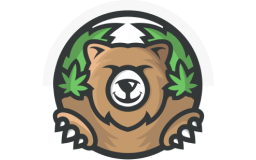Difference between THC and CBD - The most important facts at a glance!
- CBD and THC are secondary plant substances from hemp, known as cannabinoids.
- They are particularly concentrated in the female flowers to protect them from predators and pathogens.
- As phytocannabinoids, they mimic the human body's own endocannabinoids, important messengers of metabolism.
- Like these, they act by binding to special receptors on the surface of cells.
- While THC makes you high, the legal CBD has mainly a calming effect.
- CBD flowers and CBD oil are legal as long as they do not exceed the THC content of 0.2%.
Supplier of THC and CBD: The hemp plant
The cannabis plant is one of the oldest useful plants of mankind. True hemp(Cannabis sativa) belongs to the hemp family(Cannabaceae). For at least 8,000 years, its fibres have been used for textiles, the seeds have been pressed into oil and the flowers have been used as a remedy.
Female flowers of cannabis are particularly rich in secondary plant substances. Hemp is dioecious, so there are males and females. Humans have been using the latter in particular for a long time.

Hands off my flowers!
Secondary plant substances are called secondary because they are not directly important for survival. But that doesn't make them unimportant: some terpenes keep bacteria, fungi and insects away. They are particularly exposed in the stellate hairs on the plant. An extremely large number of trichomes are found on the female flowers, because they form seeds and are responsible for reproduction. Therefore, they need special protection.
Phytocannabinoids also have the chemical structure of terpenes. They are so called because the human body reacts to them in a similar way to its own endocannabinoids. As messenger substances, they control many metabolic processes. Interfering with these and befuddling predators is the original purpose of THC and CBD.
How do cannabinoids work?
The human endocannabinoid system consists of ligands and their receptors:
- Messenger substances such as anandamide (arachidonoylethanolamide, AEA) and 2-arachidone glycerol (2-AG) mediate between cells.
- To do this, they bind to receptors on the surface:
- CB1 recept or is found in the central nervous system,
- CB2 receptor mainly in the immune system, gastrointestinal tract and endocrine glands.
When a ligand binds to a receptor, it alters pain perception, emotions and appetite. Or it protects nerve cells, modulates the immune defence and much more. This also applies to phytocannabinoids. They act by activating or inhibiting the two receptors.
THC and CBD have different effects
Over hundreds of cannabinoids and about 400 other terpenes have been found in hemp. Besides CBD and THC, these include CBN (cannabinol), CBG (cannabigerol) or CBT (cannabitriol).
The effect of THC, CBD and other cannabinoids is a complex matter. It is based on several factors:
- They bind to the two receptors to different degrees.
- In doing so, they have an activating or dampening effect.
- On the surface of a cell, CB1 and CB2 are present in varying amounts.
- The pattern of expression varies depending on the tissue and organ.
- The effect of CBD and THC results from numerous influences on many organs.
- Several cannabinoids together act differently than single ones. This also applies to the entourage effect.
- Pharmacokinetics also play an important role. How is a substance absorbed, distributed, broken down and excreted. All this determines what cannabinoids do, how quickly CBD works and for how long.

How does THC work? And how is it different from CBD?
CBD and THC do not have the same effect on the psyche: THC has a psychoactive effect, CDB does not make you "high". THC works because the brain releases the neurotransmitter dopamine. The happiness hormone feels like a reward. Together with adrenaline and noradrenaline, it controls the ability to concentrate, pain perception, fine motor skills and coordination.
What leads to positive effects in small amounts causes intoxication when too much is consumed. Because the feel-good hormone serotonin enters the blood at the same time, physical dependence on THC cannot be completely ruled out.
Most important difference between THC and CBD:
- CBD has no intoxicating effect.
- CBD is definitely not addictive.
Legal status of CBD and THC
THC falls under the Narcotics Act (BtMG) and may only be present in small quantities in hemp products. To prevent possible abuse, a maximum of 0.2 percent THC is allowed in CBD oil.
CBD products such as CBD oil and CBD flowers are legal - as long as they do not exceed the specified THC content. At Lucky Hemp, you can rest assured that we adhere to the legal regulations and strictly control them.
Do you get 'high' from CBD flowers?
No.You can't consume enough THC to get high. Provided, of course, that you consume CBD flowers of impeccable quality, such as those from Lucky Hemp.
Medical effects of cannabidiol: No effect without side effects
No side effects, no effect. They can occur, but do not have to. This old wisdom also applies to CBD. Most often, cannabidiol makes you tired and dizzy. Less frequently, nausea, diarrhoea and low appetite occur, or rashes appear on the skin. Some patients experienced an opposite effect of inner restlessness and sleep disturbances.
Can CBD trigger psychoses?
This is not very likely - psychoses and hallucinations are more likely to occur with THC. Nevertheless, psychoses can occur in individual cases after taking CBD oil. This is especially true if the oil is used incorrectly, especially if the dosage is too high.

CBD in medicines
Cannabidiol has an effect that is also used in medicine. Epidiolex and Nabiximols are drugs against epilepsy and multiple sclerosis. They were thoroughly investigated in clinical trials before they were put on the market. They are certainly not the last medicines with CBD.
Does CBD make you positive?
With prolonged use of CBD oil or CBD flowers, a positive drug test cannot be ruled out. Even if the CBD product complies with the legally prescribed THC concentration of less than 0.2 percent. Modern drug tests are so sensitive that they detect even minimal THC levels. This does not pose a health risk. However, those who have to undergo such controls because of work should keep this in mind.
CBD or THC for pain?
In Germany, a doctor may only prescribe medical marijuana for pain as a rare exception. In the USA, dronabinol (Marinol) is approved. Pain is also relieved by the epilepsy drug Epidiolex and Nabiximols (Sativex) for multiple sclerosis. Here, however, the effect of CBD against convulsions and seizures is more important.
Conclusion: You are on the safe side with high-quality CBD oil
CBD flowers for pain or CBD oil for stress and anxiety? You can't go wrong with the products from Lucky Hemp. You can use them legally without hesitation!





